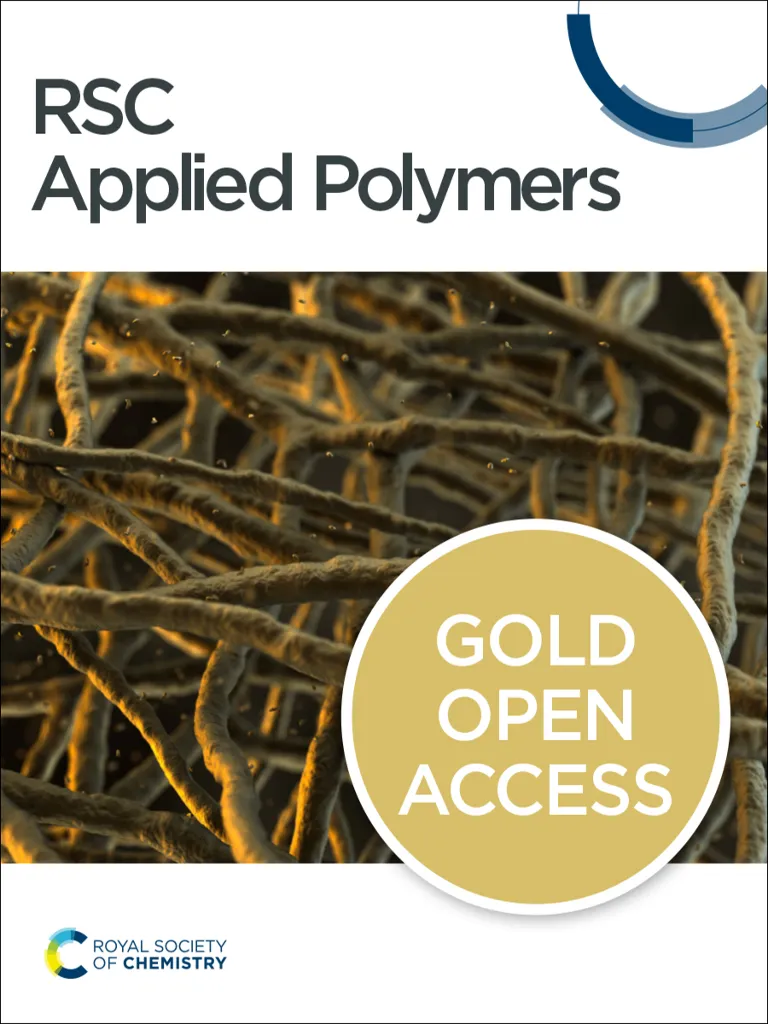RSC Applied Polymers
The application of polymers, both natural and synthetic
Editor-in-Chief: Emily Pentzer
Open Access: Gold

RSC Applied Polymers is one of the first of our journals to focus on applied research, offering you an impactful platform for the application of polymers, both natural and synthetic, including experimental and computational studies.
ISSN: 2755-371X
Indexed in: Directory of Open Access Journals (DOAJ), IET INSPEC, Scopus
Journal Impact factor
NA
First decision time (all)
8 days
First decision time (peer reviewed)
36 days
Scope
RSC Applied Polymers is a leading international journal for the application of polymers, including experimental and computational studies on both natural and synthetic systems.
The journal is a premier cross-disciplinary publishing home for scientific research that leverages polymeric materials in a range of applications, welcoming high-impact advances made possible with polymers across materials, biology, energy applications, and beyond.
Polymer researchers across chemistry, materials science, biology, and engineering, are all welcome to share timely and impactful contributions, connecting fundamental scientific insights to performance-related metrics. The journal welcomes research on the application of polymers in different areas, and the relationship to structure and/or composition, as afforded by synthesis and/or processing.
Topics include but are not limited to:
- Materials: inks, packaging, coatings, membranes, textiles, dyes/pigments, flame retardants, reprocessable/recyclable, etc.
- Biology: bioinspired/biomimicking, biointerfacing, bioresponsive, therapeutic, etc.
- Energy: harvesting, storage, interconversion, management, separations, etc.
Consistent with the vision and values of the RSC, the journal welcomes and celebrates research that supports the advancement of several UN Sustainable Development Goals (SDGs), including but not limited to SDG3: good health and well-being, SDG6: clean water and sanitation, SDG7: affordable and clean energy, and SDG12: including responsible production and consumption.
RSC Applied Polymers will be the leading international journal for the latest advances made possible with polymers, from energy harvesting and management to payload delivery, and beyond. The journal will promote the advancement of science by publishing timely and impactful cross-disciplinary research that connects fundamental insights to performance-related metrics.
Emily Pentzer, Editor-in-Chief, RSC Applied Polymers
Information for authors
Want to publish in this journal? Our author guidelines explain how to prepare and submit your article and provide useful information on the review and publication process including transfers, revisions and any article processing charges (APCs) that may apply.
We are covering all article processing charges until mid-2026, so you can publish in this journal for free.
Meet the team





Friederike Adams
University of Stuttgart
Kristi Anseth
University of Colorado
Jason Bara
The University of Alabama
Matthew L. Becker
Duke University
Sidi A. Bencherif
Northeastern University
Emiliano Bilotti
Imperial College London
Eva Blasco
Heidelberg University
Stefan A. F. Bon
University of Warwick
Antoine Buchard
University of York
Kelly A. Burke
University of Connecticut
Delphine Chan-Seng
CNRS - Institut Charles Sadron
Jiayao Chen
Beijing University of Chemical Technology
Nathaniel Corrigan
University of New South Wales
Patricia Dankers
Eindhoven University of Technology
Anindita Das
Indian Association for the Cultivation of Science
Bruno De Geest
Ghent University
Guillaume Delaittre
University of Wuppertal
Sabyasachi Gaan
Empa Swiss Federal Laboratories for Materials Science and Technology
Matthew Gibson
University of Manchester
Jean François Gohy
Université Catholique de Louvain
Craig Hawker
University of California Santa Barbara
Manickam Jayakannan
Indian Institute of Science Education and Research (IISER) Pune
Kristian Kempe
Monash University
Sébastien Lecommandoux
University of Bordeaux
Koon-Yang Lee
Imperial College London
Meike N. Leiske
University of Bayreuth
Yiwen Li
Sichuan University
Guoliang (Greg) Liu
Virginia Tech
Wei Lu
University of Michigan
João F. Mano
University of Aveiro
Heather D. Maynard
UCLA
David Mecerreyes
University of the Basque Country
Phillip Messersmith
University of California
Alshakim Nelson
University of Washington
David Y. W. Ng
Max Planck Institute for Polymer Research
Julien Nicolas
University Paris-Sud
Lutz Nuhn
Julius-Maximilians-Universität Würzburg
Keiji Numata
Kyoto University
Moon J. Park
Pohang University of Science & Technology
Luiz Antonio Pessan
Federal University of São Carlos
Jean-Marie Raquez
University of Mons
Eleftheria Roumeli
University of Washington
Sampa Saha
Indian Institute of Technology Delhi
Dinesh Shetty
Khalifa University of Science & Technology
Anita Shukla
Brown University
Molly Stevens
Imperial College London
Brent S. Sumerlin
University of Florida
Helen Tran
University of Toronto
Brigitte Voit
Leibniz Institute of Polymer Research Dresden (IPF
Junpeng Wang
University of Akron
Christoph Weder
University of Fribourg
Daniela A. Wilson
Radboud University
Peiyi Wu
Donghua University
Xuzhou Yan
Shanghai Jiao Tong University
Panchao Yin
Guangzhou International Campus
Haifeng Yu
Peking University
Xi Zhang
Tsinghua University
Ning Zheng
Zhejiang University
Jintao Zhu
Huazhong University of Science and Technology
Jeremy Allen
Executive Editor
Hannah Kerr
Deputy Editor
Rosie Hague
Editorial Assistant
Lilybelle Wyatt
Editorial manager
Zifei Lu
Assistant Editor
Ashley McGovern
Assistant Editor
Sean Browner
Assistant Editor
Paul Scott
Assistant Editor
Robert Griffiths
Publishing Assistant
Neil Hammond
Publisher
Read this journal
Paper
Synthesis of an anion exchange resin for enhanced PFAS adsorption in water treatment
Paper
Development of casein-based nanonutraceuticals by entrapping anthocyanin derived from secondary-agricultural residues: a step towards functional food additives
Paper
Reversible magnetic soft actuators made of thermoplastic polyurethane and yttrium iron garnet
Review article
Hypercrosslinked polymer by an external crosslinker strategy: formation mechanism, structural regulation and applications
More from this journal
Contact the journal team
We're here to help. Contact the journal team if you have any questions about publishing your paper with us.
Sign up for journal email alerts
Get table of contents alerts and notifications about calls for papers, themed issues and more.
